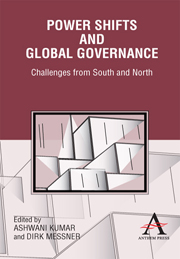Book contents
- Frontmatter
- Contents
- List of Contributors
- Foreword
- Power Shifts and Global Governance
- Part One Theoretical and Analytical Reflections on Global Governance
- 1 Introduction: Global Governance: Issues, Trends and Challenges
- 2 Four Lessons from the Present Global Financial Crisis for the 21st Century: An Essay on Global Transformation from a European Perspective
- 3 Global Civil Society: Emergent Forms of Cosmopolitan Democracy and Justice
- 4 Institutional and Policy Implications of International Public Goods: The Case of Global Commons
- 5 Economic Challenges for Global Governance
- 6 The Rule of Law in Multilateral Institutions and International Aid for Development: Judicial Reform in the Global Order
- Part Two Power Shifts, Regional Experiences and Global Challenges
- Part Three Case Studies in Global Governance
- Notes
5 - Economic Challenges for Global Governance
from Part One - Theoretical and Analytical Reflections on Global Governance
Published online by Cambridge University Press: 05 March 2012
- Frontmatter
- Contents
- List of Contributors
- Foreword
- Power Shifts and Global Governance
- Part One Theoretical and Analytical Reflections on Global Governance
- 1 Introduction: Global Governance: Issues, Trends and Challenges
- 2 Four Lessons from the Present Global Financial Crisis for the 21st Century: An Essay on Global Transformation from a European Perspective
- 3 Global Civil Society: Emergent Forms of Cosmopolitan Democracy and Justice
- 4 Institutional and Policy Implications of International Public Goods: The Case of Global Commons
- 5 Economic Challenges for Global Governance
- 6 The Rule of Law in Multilateral Institutions and International Aid for Development: Judicial Reform in the Global Order
- Part Two Power Shifts, Regional Experiences and Global Challenges
- Part Three Case Studies in Global Governance
- Notes
Summary
Introduction
The acceleration of globalization in the 1980s began with the revival of classical liberal economics, as Keynesian policies reached their demise. Faced with the stagflation crisis of the 1970s and the first oil crisis, Ronald Reagan and Margaret Thatcher restarted economic growth by freeing trade and investment. They cut income taxes, especially for the wealthy, deregulated and privatized the economy, reduced the power of trade unions, weakened the welfare state and lifted barriers to trade and investment at home and abroad, therefore raising incentives for investment. Many underdeveloped countries faced similar crises at the time, especially those following import substitution models, and fell into debt through rising interest rates and oil prices. Essentially the same macroeconomic and growth policies were applied in underdeveloped countries, following what became known as the Washington Consensus (Williamson 1990). In addition, when the Berlin Wall fell in 1989, the end of the Cold War created a global market economy. As free trade and investment treaties proliferated, globalization accelerated. In particular, foreign direct investment (FDI) increased worldwide at an average rate of almost 28 per cent a year from 1983 to 1998. Thus, freer markets and a reduced government role in both developed and underdeveloped countries released a fresh wave of globalization. The new schools of economic thought produced theories implying that free trade and FDI would lead to the equalization of growth rates and production levels across countries.
- Type
- Chapter
- Information
- Power Shifts and Global GovernanceChallenges from South and North, pp. 93 - 122Publisher: Anthem PressPrint publication year: 2010



